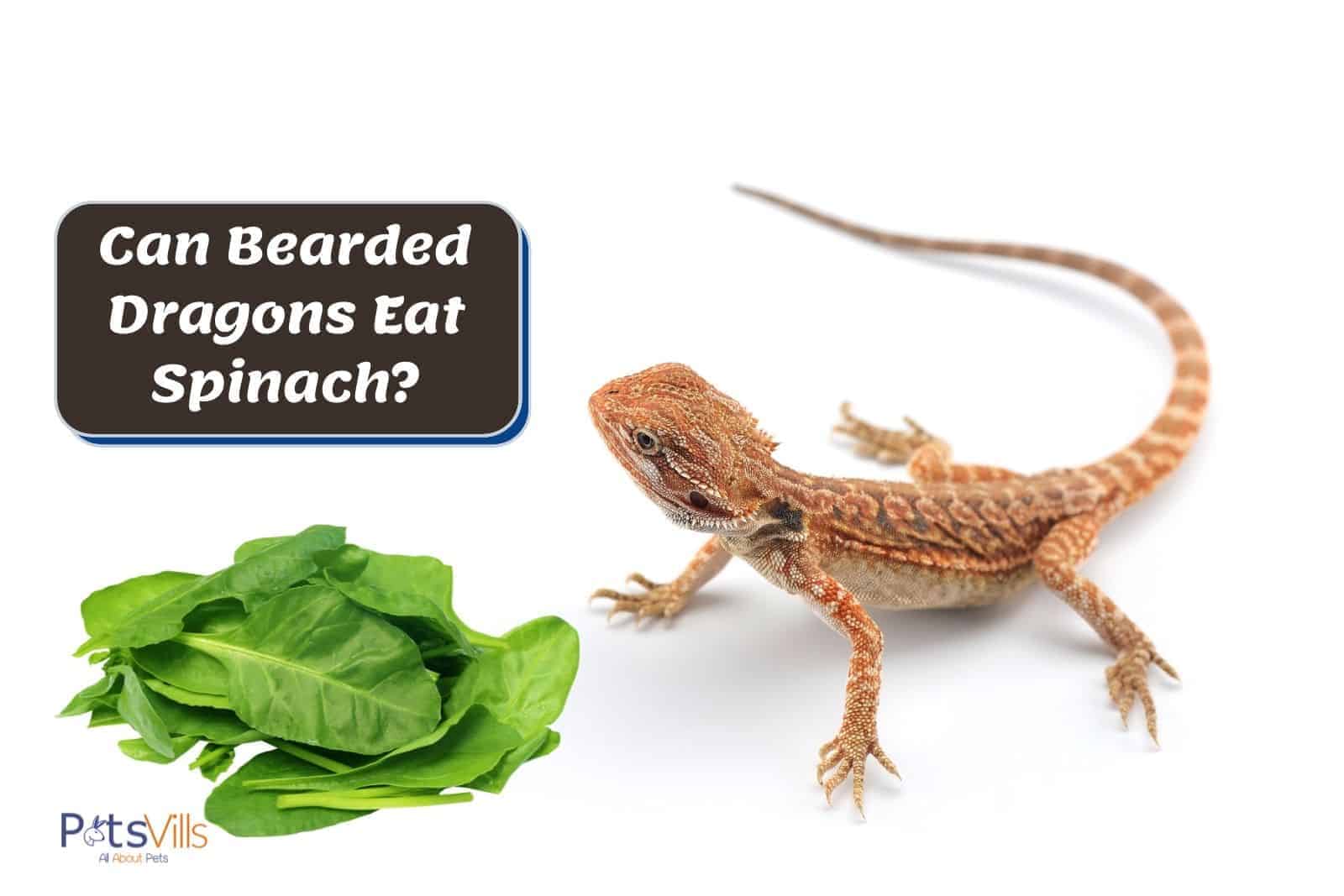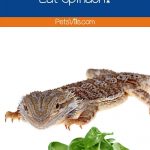Can bearded dragons eat spinach?
Is this green leafy vegetable is good for beardies as it is for their owners?
Or does it do them more harm than good?
Read on for an in-depth look at everything you need to know about beardies and spinach!
Check and purchase this amazing Bearded Dragon Feeding Guide!
Table of Contents
Can Bearded Dragons Eat Spinach?
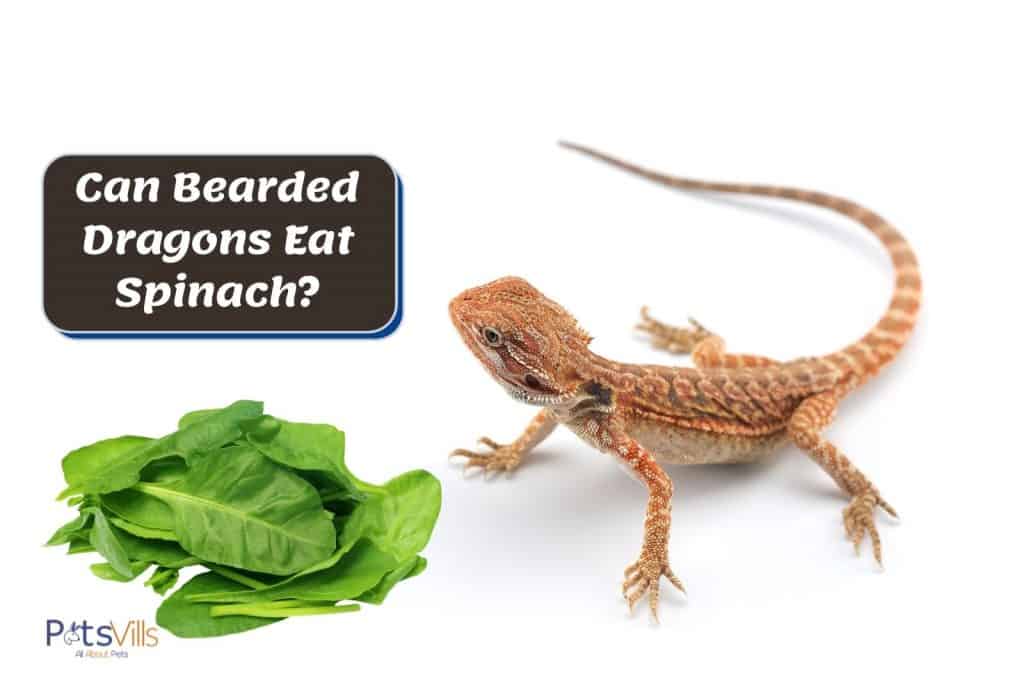
Yes, technically, bearded dragons can eat spinach. It’s not toxic to them and has a nutrient profile that looks great on paper.
However, some compounds in spinach mean it isn’t suitable as a regular staple in your beardie’s varied diet. Ideally, you should avoid giving it to them altogether.
What are these compounds? They are known as oxalates or oxalic acids. They can affect your beardie’s ability to absorb calcium, a vital nutrient.
More on that later…
First, I’d better give you some idea of how much spinach professionals advise you to serve your reptile friend.
Related: Can Guinea Pigs Eat Lettuce?
How Often Can Bearded Dragons Have Spinach?
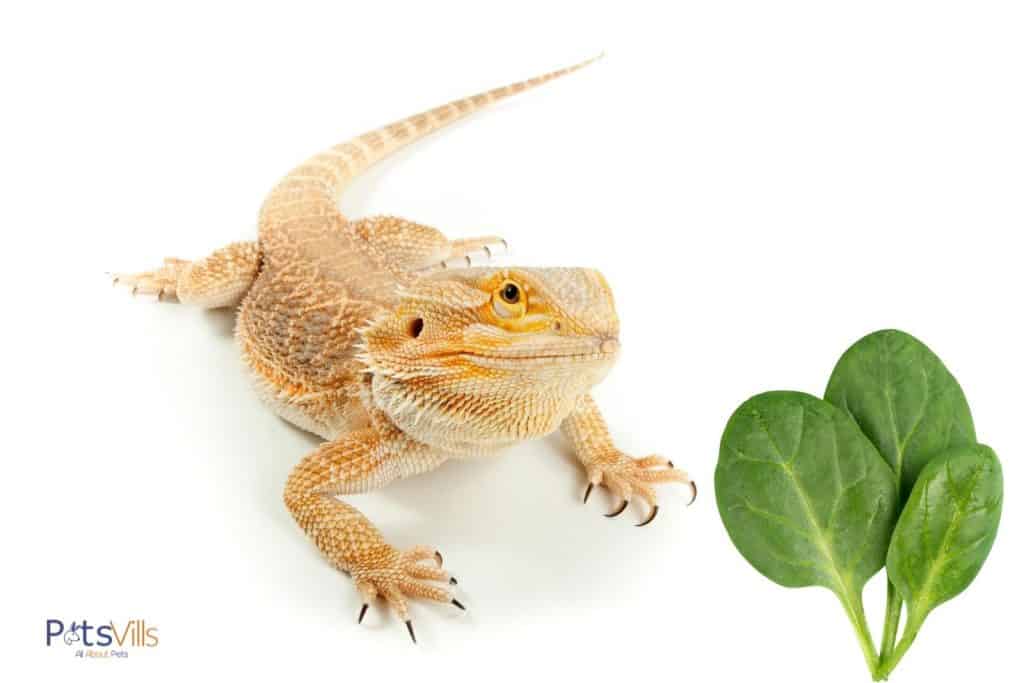
Veterinary Dr. Edele Grey recommends that you do not feed your bearded dragon spinach.
She states that one or two leaves will not be harmful but that it’s better to consider safer leafy green vegetables.
There are some posts out there suggesting you can feed your beardie a few spinach leaves once every month or so.
However, I would be inclined to follow veterinary advice and avoid giving it to them altogether.
There are plenty of safer, more nutritious alternatives out there; spinach simply isn’t worth the hassle in my book.
More on spinach alternatives later…
Before we move on to the pros and cons, I’d like to give you a little context on what a well-balanced bearded dragon diet looks like.
Bearded Dragon Dietary requirements
Veterinary Dr. Rick Axelson is my go-to when it comes to dietary advice for bearded dragons.
The first thing to know about beardies is that they are omnivores, meaning they eat both meat and plant-based foods.
Their nutritional needs change as they grow older, something that is clearly reflected in the balance of meat/plant-based food types they consume.
For younger and baby bearded dragons, the balance skews to as much as 70/30 in favor of meat.
For adult bearded dragons, the balance flips as far as 70/30 in favor of plant material.
If you’re looking for new meat sources for your beardie, check out our article, “Can Bearded Dragons Eat Nightcrawlers?”.
Vegetables should account for 80-90% of the plant-based segment of your beardies diet. The remainder should be made up of fruit.
Benefits of Spinach for Bearded Dragons
Spinach Nutritional Value
So, is spinach good for bearded dragons?
Read on to discover some of the key nutrients found in spinach and why they would be good for your bearded dragon.
Values per 100 g of raw spinach
| Water | 91.4 g |
| Energy | 23 kcal |
| Protein | 2.86 g |
| Fat | 0.39 g |
| Carbohydrates | 3.63 g |
| Fiber | 2.2 g |
| Sugar | 0.42 g |
| Calcium | 99 mg |
| Phosphorus | 49 mg |
| Potassium | 558 mg |
| Vitamin C | 28.1 mg |
| Vitamin A | 469 µg |
| Iron | 2.71 mg |
| Magnesium | 79 mg |
Low in Calories, Sugar, and Fat
Obesity can be a problem for beardies (and bearded dragon owners!), so it’s important to watch what they eat.
Bearded dragons are no different. So, the fact that spinach is low in calories, sugars, and fats means it ticks the healthy treat boxes in that respect.
The high water content in spinach accounts for these low values, making it a potential source for additional hydration too.
Any water content should be seen as a bonus and is no replacement for supplying adequate fresh water.
Good Balance of Calcium and Phosphorus
Calcium is essential to bearded dragons. A lack of calcium in their diet can cause significant problems, especially for younger beardies.
Calcium is so essential that vets often recommend sprinkling a calcium powder supplement over your beardie’s food.
The relationship between calcium and phosphorus is important as phosphorus binds to calcium, making it impossible for beardies to absorb.
Calcium deficiency in bearded dragons leads to a condition called metabolic bone disease (MBD).
Veterinary Dr. Margaret Wissman writes that the calcium to phosphorus ratio should fall in the region of 1.5 to 2:1.
With 99 mg of calcium and 49 mg of phosphorus per 100 g, spinach fits this ratio almost perfectly.
High in potassium
Per 100 g, spinach has significantly more potassium than a banana, a fruit renowned for its high mineral levels. Why is potassium good?
Potassium helps to regulate healthy kidney function, muscle activity, and fluid levels.
Good Source of Vitamins
Spinach is a source of many vitamins, including A, B-6, and C.
- Vitamin A is associated with many health benefits in humans. It is responsible for healthy vision, a healthy immune system, supporting growth and development, and may even lower the risk of certain types of cancer.
- Vitamin B-6 is linked to brain development and maintaining the health of the immune and nervous systems. It also plays a role in maintaining a healthy weight.
- Vitamin C plays a role in the development, growth, and repair of body tissue. It also helps with iron absorption, proper immune function, and the maintenance of bones.
Rich in Minerals and Antioxidants
The rich blend of minerals and antioxidants found in spinach can help to reduce cholesterol, avoid heart problems.
They also play a role in helping to keep your beardie’s tissue and bones healthy and strong.
So, with all that good stuff going for it, why is spinach something that bearded dragons should avoid? It all comes down to one thing. Oxalates.
Read about it now…
Dangers of Feeding Beardies Too Much Spinach
Oxalates and Calcium
Earlier, we touched on the problems that can arise if a bearded dragon doesn’t get enough calcium in its diet.
This is something that can occur if beardies eat food that has a high ratio of phosphorus compared to calcium. Bananas are one such example.
Spinach has a similar problem, but this time it comes in the form of a high concentration of oxalates or oxalic acids.
The oxalates bind to the calcium, meaning your beardie is not able to absorb it. This applies to calcium from other sources that is being digested at the same time too.
A lack of calcium in a beardies diet and a prolonged calcium deficiency can lead to a condition called metabolic bone disease (MBD).
What is Metabolic Bone Disease?
Veterinary Dr. Rick Axelson tells us that Metabolic bone disease (nutritional secondary hyperparathyroidism) is possibly the most common health issue seen in bearded dragons kept as pets.
Most common in younger beardies (under two years of age), MBD is a condition in which calcium-deficient bones become soft, weak, and eventually deformed.
MBD is generally caused by a poor diet that is too high in phosphorus and too low in vitamin D-3 or calcium.
While the ratio of calcium and phosphorus found in spinach is actually perfect for a bearded dragon, the oxalates mean that the calcium content may never actually be absorbed.
With the balancing act required to manage your beardie’s calcium intake, it starts to become clearer as to why vets advise against feeding this particular leafy green.
Signs and symptoms of MBD
MBD is not to be taken lightly, so thankfully, the signs and symptoms are pretty obvious and easy to spot.
Signs and symptoms of metabolic bone disease include:
- Lethargy
- Loss of appetite
- Swelling of the lower jaw
- Swelling of other facial bones
- Swelling of the rear limbs
- Shaking when trying to walk
- Crouching low to the ground
- Seizures
- Immobility
Spinach Alternatives for Bearded Dragons?
Have I managed to sell you the idea of leaving spinach off the menu for your dragon?
If so, you probably want to know about some alternative leafy green vegetables and plants you can give them instead.
Here is a list of 6 staple food greens you can give your beardie on a daily basis:
1. Collard Greens
With a calcium-phosphorus ratio of 14.5 to 1, these greens are a beardie superfood. Lots of calcium for your dragon coupled with a great vitamin, fiber, and folate profile.
What’s not to like!?
2. Cactus or Prickly Pear
Carefully cut away the spikey exterior, and you have a delicious treat for your beardie.
Chopped into bite-sized pieces, the fleshy part of this plant is packed full of calcium, vitamins, fiber, and antioxidants.
3. Turnip Greens
Another leafy green with a great calcium-phosphorus ratio, turnip greens add a little spice to your beardie’s bowl, as well as plenty of vitamins and calcium.
They are relatively high in oxalates, so you don’t want turnip greens to form the bulk of any dragon’s meal. Just add a few into the mix with other, oxalate-free greens.
4. Dandelion Greens
Dandelion leaves are a good source of calcium and vitamin A. Like turnip greens, they do contain oxalates, so they are best served with something that had no oxalic acids. Collard greens, for example.
5. Mustard Greens
Similar to turnip greens, mustard greens can add a little bit of spice to an otherwise bland mix of vegetables.
Another thing they both have in common is that the oxalate content.
You wouldn’t want to serve a whole bowl of mustard greens, but they’re fine mixed in with some prickly pear or collard greens.
Mustard greens have plenty of calcium and lots of vitamin A, C, and K.
6. Escarole
Escarole can add a little texture and crunch to your beardie’s meal. It’s a source of calcium, but it needs to be paired up with a calcium-rich, oxalate-free green as it contains some oxalic acids.
Learn more about bearded dragon diet expenses and find complete lists on what else to feed them (and what NOT to feed them) in our brand-new book!

FAQs
Can Spinach Kill a Bearded Dragon?
Eating a spinach leaf will not kill a bearded dragon as it isn’t toxic to them. However, the oxalates found in spinach are a big problem. These compounds interfere with calcium absorption, causing severe health problems in the longer term.
Can Bearded Dragons Eat Raw Spinach?
Your bearded dragon can eat spinach in very small quantities, but it is better to avoid it altogether. Compounds (oxalates) found in spinach interfere with calcium absorption, leading to a deficiency of this vital mineral.
Do Beardies Like Baby Spinach?
Baby spinach is like regular spinach, so if your beardie likes one, they will enjoy the other. Let’s face it, bearded dragons aren’t the fussiest of eaters! Worth noting, vets advise against feeding spinach due to the oxalic acid content.
Summing It Up: Can Bearded Dragons Have Spinach?
Can bearded dragons eat spinach? Is spinach good for bearded dragons? Those were the questions I set out to answer in this article.
If you read from start to finish, you will now have a good idea of the pros and cons of giving your bearded dragon spinach.
At first glance, spinach looks like it ticks all of the nutritional boxes for beardies. It even has the ideal calcium to phosphorus ratio.
But the oxalates in spinach make it a no-go for your bearded dragon. They prevent proper calcium absorption and can create a calcium deficiency in your beardie.
This, in turn, can lead to the onset of metabolic bone disease. Something that is sadly very common in beardies.
Thankfully you’ve done the groundwork and read this article. You’re well informed and able to make the right decisions for your bearded dragon.
If you’re still in doubt, speak to a friendly vet for further advice.
Thanks for reading!
References
- Brennan, D (MD) 2020, 8 Foods High in Oxalates and Why You Should Avoid It, Web MD, viewed 15 June 2021, <https://www.webmd.com/diet/foods-high-in-oxalates>.
- Ramirez, D 2020, Can Bearded Dragons Eat Spinach? Vets Explain The Dangers, FeedingMyPet, viewed 15 June 2021, <https://www.feedingmypet.com/can-bearded-dragons-eat-spinach/>.
- Axelson, R (DVM) n.d., Bearded Dragons – Diseases, VCA Animal Hospital, viewed 14 June 2021, <https://vcahospitals.com/know-your-pet/bearded-dragons-diseases>.
- Spinach, Raw 2020, U.S. Department of Agriculture, viewed 15 June 2021, <https://fdc.nal.usda.gov/fdc-app.html#/food-details/168462/nutrients>.
- Wissman, M (DVM) 2011, Bearded Dragon Supplements, Retiles Magazine, viewed 15 June 2021, <https://www.reptilesmagazine.com/bearded-dragon-supplements/>.
- West H (RD) 2018, 6 Health Benefits of Vitamin A, Backed By Science, Healthline, viewed 15 June 2021, <https://www.healthline.com/nutrition/vitamin-a-benefits>.
- Vitamin B-6 2021, Mayo Clinic, viewed 15 June 2021, <https://www.mayoclinic.org/drugs-supplements-vitamin-b6/art-20363468>.
- Zelman, K 2020, Vitamin C Benefits, Sources, Supplements, & More, Web MD, viewed 15 June 2021, <https://www.webmd.com/diet/features/the-benefits-of-vitamin-c#2>.
- Axelson, R (DVM) n.d., Bearded Dragons – Diseases, VCA Animal Hospital, viewed 15 June 2021, <https://vcahospitals.com/know-your-pet/bearded-dragons-diseases>.
- Best Greens for Bearded Dragons, Daily and Weekly Staples n.d., Dragon’s Diet, viewed 15 June 2021, <https://dragonsdiet.com/blogs/dragon-care/best-greens-for-bearded-dragons>.
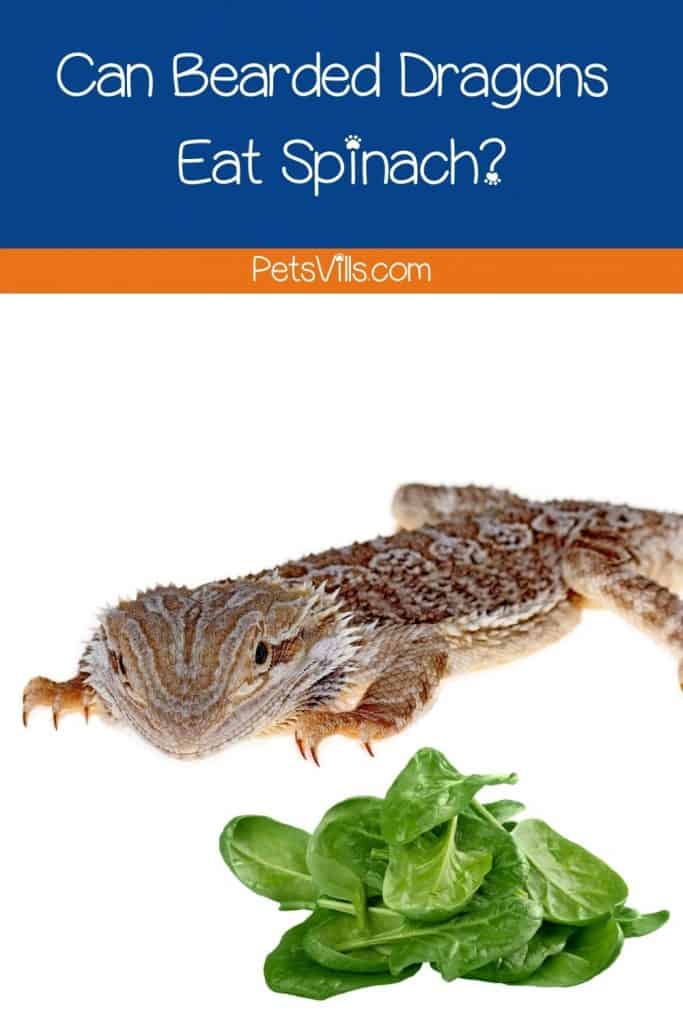
Can bearded dragons eat spinach? Share your thoughts in the comments below!
Barry Stingmore is a British content writer living in Fuerteventura, Spain. An animal lover at heart, he shares his home with a dog and four rescue cats and has a passion for writing about animals big and small.
Barry loves finding answers to your animal-related questions, the more research involved the better! You can rely on him to find the facts.
Find him on FACEBOOK, TWITTER AND Linkedin
Read his latest ARTICLES.
Find more about him HERE.

